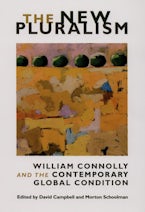“This is an engaging collection of essays that provides an accessible introduction to William Connolly’s oeuvre, but its strength lies in the varied approaches the authors explore in responding to and problematizing aspects of his thought. It is highly recommended for graduate students and those academics interested in exploring Connolly’s ideas for the first time or critically reengaging them.” - Rosemary E. Shinko, International Studies Review
“The New Pluralism. . .offers an unparalleled overview of this influential thinker.” - James Proctor, The Year’s Work in Critical and Cultural Theory
“The 11 essays demonstrate great appreciation for Connolly’s work, as well as the mode in which he reflected on contemporary politics. . . . Recommended.” - M. Coulter, Choice
“A most welcome book. Due to his impressive and highly innovative string of writings, William Connolly has emerged as a leading, perhaps the leading, political theorist in the United States today. In our globalizing and multicultural world where cultures, ethnicities, and creeds are increasingly pushed together, his defense of a new and deep pluralism acquires an urgent timeliness. The contributors to the volume ably reveal both the wide range and the intense subtlety of Connolly’s work.”-Fred Dallmayr, Packey J. Dee Professor of Political Science and Professor of Philosophy, University of Notre Dame
“This is an engaging collection of essays that provides an accessible introduction to William Connolly’s oeuvre, but its strength lies in the varied approaches the authors explore in responding to and problematizing aspects of his thought. It is highly recommended for graduate students and those academics interested in exploring Connolly’s ideas for the first time or critically reengaging them.”
- Rosemary E. Shinko (International Studies Review) “The New Pluralism. . .offers an unparalleled overview of this influential thinker.”
- James Proctor (Year's Work in Critical and Cultural Theory) “The 11 essays demonstrate great appreciation for Connolly’s work, as well as the mode in which he reflected on contemporary politics. . . . Recommended.”
- M. Coulter (Choice)

